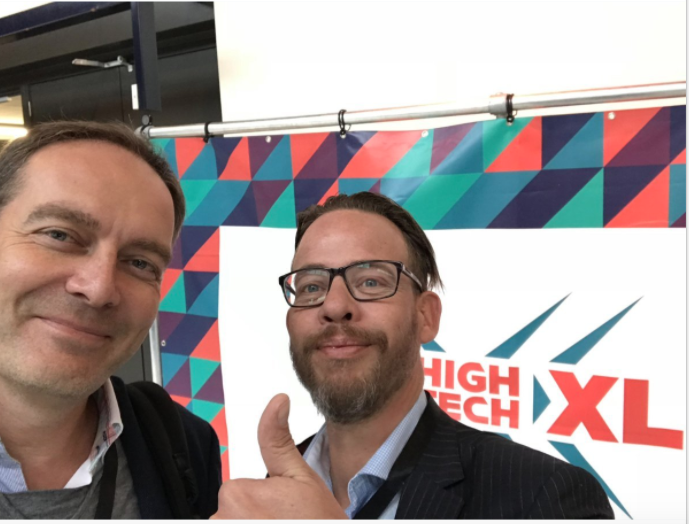(Editor’s note: This Eindhoven Business Briefing is part of Dispatches’ Tech Tuesday series covering technology and global management in Europe and Asia.)
We know … business briefings are supposed to be brief. Not this week.
Tech leaders, corporate executives and government officials in Eindhoven are pushing so hard we’re having trouble keeping up.
A large part of XL Day last Wednesday was dedicated to announcements about new initiatives including a new high tech MBA, an all-in-one startup center on High Tech Campus and a partnership between HighTechXL and Technical University Eindhoven.
Then came the news that Eindhoven officials are pushing a plan to expand its central train station, a plan valued at about 20 million euros.
Let’s wrap up HighTechXL’s demo day first.
• TicTag lands 300,000 euro investment
We expected this announcement as part of XL Day, but it came the day after.
TicTag, part of the current HighTech XL accelerator cohort, has landed its largest investment.
https://youtu.be/iDYly1fiE_Q
Here’s what TicTag team member Pieter Heersink posted on LInkedIn:
After months of work I am pleased to inform you that TicTag finalized its first round of Seed funding. With the raised EUR 300.000 TicTag is able to increase Marketing & Sales and its R&D efforts to develop our launching product to be ready to scale within 6 months. Many thanks go out to Kees van der Geer, Martijn de Vrij, AJ Schouten, Greven Investments, HightechXL and Gelderland Valoriseert!
TicTag has developed a smart tag – almost like a metal decal – that can connect pretty much anything to your smartphone. It has several advantages over older technology such as QR Codes in that TicTag offers greater connectivity and versatility, with uses from IoT to security to customer loyalty. Check out the video above … they explain it best.
Co-founder and CMO Onno van der Poel’s pitch from last week:
Here is the rest of the HighTech XL cohort.
OneSoft Digm (South Korea)
OneSoftDigm is a software company working to connect all their users’ crucial health and fitness data to a single device, then analyze that data and make health and exercise recommendations.
Project Ipsilon (U.S. and Japan)
Project Ipsilon is a cognition monitoring, testing, and assessment startup based in Rotterdam. The team’s basic approach is using simplified classical music notation as a spatial-motor test, tracking users’ responses with EEG sensors, then using AI to visualize the data.
HakkenENTERPRISE (Mexico)
HakkenENTERPRISE has developed a non-invasive test capable of detecting simultaneously both human papilloma virus (HPV) infection and cancer propensity (cervical or prostate), reaching both male and female populations to help prevent the most prevalent cancers.The Kimera test is an innovative product that will help patients and their caregivers develop personalized prevention plans.
LiquidWeb (Italy)
LiquidWeb has developed assistive technology, BrainControl, to give “locked-in” patients a continued link to their environments. These patients typically have degenerative neuromuscular diseases such as ALS or traumatic brain injuries.
HeartIn (Ukraine and U.S.)
HeartIn has developed a wearable heart-monitor, a T-shirt with a mini-electrocardiograph for people with chronic heart disease. The wearable medical device enables patients to connect ECG sensors to a smartphone or PC, with the data going to physicians. HeartIn also has a fitness version with fitness parameters.
OPPI (Mexico)
This team from Mexico developed a patented chemical process that makes many types of paint both less expensive to manufacture and environmentally friendly by dispensing with the use of solvents in the paint-mixing process. Their process modifies pigment particles in paint with the same desired coverage, and because there is no use of solvents or other additives, the product is also environmentally friendly.
About 25 percent of the startups that have gone through HighTechXL since 2013 are still in businesses, and some have had major raises.
Globally, the rate of success is about five percent, so HighTechXL founder and CEO Guus Frericks reasons that HighTechXL is beating the industry norm by 5x.
In four years, HighTechXL has gone from six startups per year to 120 including accelerating internal corporate projects.
Plans are for HighTechXL to continue its expansion into Shanghai and Boston.
“We just need execution,” Frericks said. “When we say what we gonna’ do, we do what we say we were going to do.”
• More big developments

XL DAY GUEST SPEAKER SANDER ARTS, LEFT, AND GUUS FRERICKS
As we posted earlier, XL Day was about much more than pitches. There were multiple big announcements including a new HighTech MBA created by HighTechXL, Maastricht School of Management and High Tech Campus Eindhoven.
“I think getting the Tech MBA up and running on campus is pretty significant,” Frericks said. “There’s nothing else like it in the world.”
The High Tech MBA combines MSM’s course with HighTechXL’s startup accelerator.
MBA students get to be part of a startup team and learn how to build a business by working on real-life cases, Frericks said, while young tech companies get additional brain power.
“That creates a pretty unique value proposition.”
Adding practical knowledge to classical MBA means “the whole theoretical framework suddenly gets far more depth,” he added.
“That’s pretty cool!”
• More developments
Another major XL Day announcement was a plan to consolidate a number of startup initiatives including HighTechXL at Building 27 on HTC.
The idea is to bring everything under one roof in a building with 3,000 m2 of space. HighTechXL, which has two buildings on the campus, is full, Frericks said. To create an integrated ecosystem, there’s a plan to bring in HighTechXL alumni, new startup cohorts, mentors and investors.
“It makes sense to keep alumns on campus as they grow,” Frericks said.
Finally, HighTechXL announced a partnership with Technical University Eindhoven. A number of successful HighTechXL graduates including Amber Mobility, Hugsy and Usono came out of TU/e and went through HTXL, Frericks noted.
TU/e has its own campus-based ecosystem with early-stage incubation. TU/e sets up or scales up as many as 70 companies per year.
Those TU/e startups tend to go through the mid-levels of development – from concept to an initial product.
Now, TU/e startups will enter the HighTechXL accelerator program starting with 20 in 2018.
• Connecting to the world
One of Eindhoven’s major advantages is its location … a quick trip from a dozen European innovation centers by train or plane including Brussels, Amsterdam, Dusseldorf and Cologne. Now, the plan is to expand the central train station and add a hub, according to media reports.
A new hub would have space for direct international trains to Düsseldorf and other cities in Germany. At the moment, to get to the Düsseldorf Airport, which is a discount hub with a huge number of flights, travelers have to take a train to Amsterdam.
As Eindhoven expects 30,000 more expats in the next few years, expanding the train station into an international hub is critical. Between the expansion efforts of Eindhoven Airport and now regional train transport, the economic impact will be exponential, making Eindhoven more attractive to companies and tech talent needed here.
And it’s all about the global mobility of talent.
There is also a nascent – and as yet unfunded – plan to add train service from Eindhoven’s central station to Eindhoven Airport about 9 kilometers to the east.
As we noted last August, Eindhoven Airport executives know they’re sitting on a major asset nowhere near its potential. Moreover, airport management sees the 30,000-strong expat community as an increasingly important customer base as global tech giants based here, such as ASML, expand globally.
Eindhoven Airport served about 4.7 million passengers in 2016. The airport is projecting traffic to grow by 1 million passengers to a total of 5.7 million in 2017. The airport served its 5 millionth passenger in late November and seems on track to reach its goal by the end of the year.
• One of the biggest deals that somehow stays under the radar is a 45 million euros Series C round raised by Xeltis. This is the largest investment round for a private medical device company in Europe in 2017.
Xeltis is a clinical stage startup that has developed polymer-based heart valve technology for patients. The effort already has FDA approval.
From the website:
Endogenous Tissue Restoration (ETR) is a new therapeutic approach, enabling the patient’s own body to naturally restore a new heart valve. With ETR, the patient’s natural healing system develops tissue that pervades Xeltis’ heart valve, forming a new, natural and fully functional valve within it. As ETR occurs, Xeltis implants are gradually absorbed by the body.
The C round was led by investments from venture capital fund Ysios Capital and a number of large private investors, according to the Xeltis website. Previous institutional investors LSP, Kurma Partners and VI Partners and private investors are tagging along.
• About Eindhoven:
Eindhoven has an ecosystem comparable to Silicon Valley, bolstered by semiconductor suppliers ASML and NXP, the Dutch equivalents of Hewlett-Packard and Intel.
Intel actually owns a minority interest in ASML, which produces the photolithography technology that etches nanocircuitry onto chips. Qualcomm recently acquired NXP for $48 billion.
And, like Silicon Valley, Eindhoven has a stand-out university, Technical University Eindhoven, that’s not so dissimilar to Stanford in that it constantly creates new high-tech startups.














